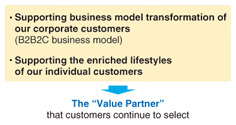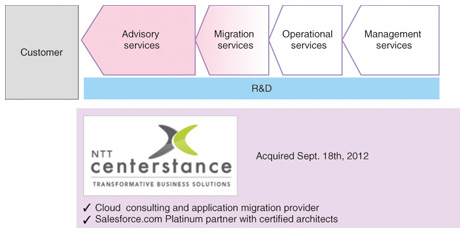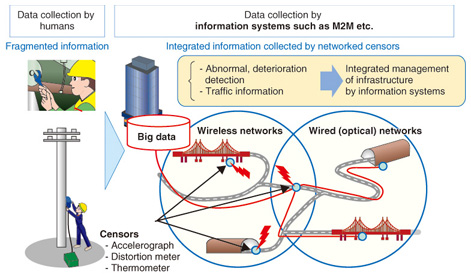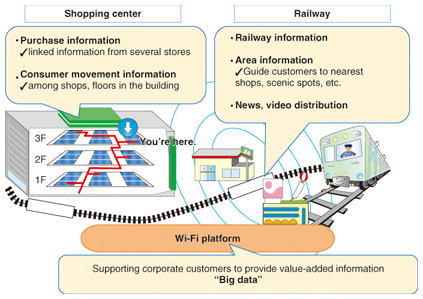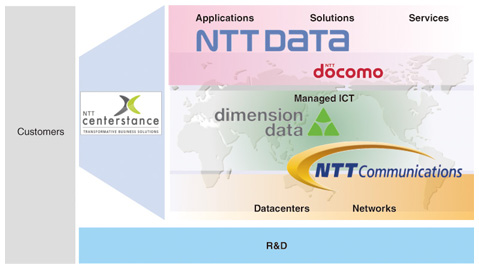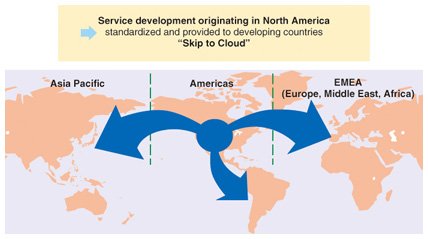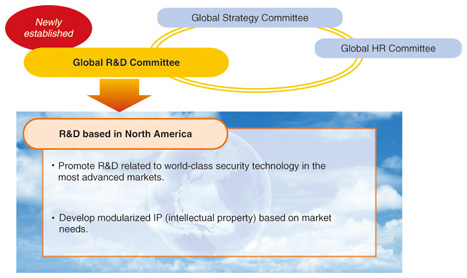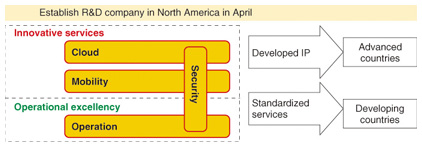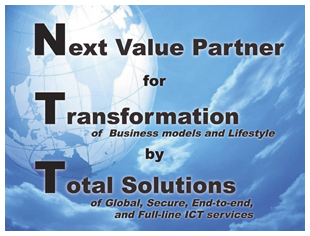 |
|||||
|
|
|||||
|
Feature Articles: Keynote Speeches at NTT R&D Forum 2013 Vol. 11, No. 4, pp. 1–7, Apr. 2013. https://doi.org/10.53829/ntr201304fa1  From a Provider to a "Value Partner"AbstractIn the fall of 2012, the NTT Group announced a new Medium-Term Management Strategy titled Towards the Next Stage. This article introduces the NTT Group’s new approach to business based on this strategy and presents the progress made so far in achieving established objectives. The content of this article is based on the keynote speech given by Hiroo Unoura, President and Chief Executive Officer of NTT, at NTT R&D Forum 2013, held on February 14–15, 2013. 1. The “value partner” that customers continue to selectThe basic concept of the NTT Group’s new Medium-Term Management Strategy can be summed up as a transition from a provider to a “value partner” (Fig. 1). Since taking up my post as president, I have been constantly highlighting the importance of this transformation from being a provider to a value partner especially in terms of “supporting the business model transformation of our corporate customers” and “supporting the enriched lifestyles of our individual customers.” To achieve this transformation, the Medium-Term Management Strategy describes two key initiatives: (1) Make global cloud services the key pillar of NTT’s business operations to drive growth and change throughout the NTT Group. (2) Raise the competitiveness of network services.
In the era of cloud computing, I believe that customers have more choices than ever before; that is, customers are no longer tied to one provider but can switch from one service to another as desired. Under such conditions, the ability to become the value partner that customers continue to select is exactly what being competitive is all about. There are various points to consider in becoming such a value partner, but I believe that we need to provide our customers with services that fit their needs (suitable), that are easy to use, including their charging schemes and user interfaces (simple), and that are safe and secure to use, especially in today’s cloud era (secure). In this way, I think that customers will come to view us as a value partner. 2. Enhancement of cloud servicesAt present, the NTT Group provides services to over 10,000 global corporate customers. These, however, include customers to whom we provide only some portions of their systems. So our next challenges will be determining how to uncover the needs of such customers and how to increase the total number of customers. In addition to its large customer base, the NTT Group also has other strengths. Our world-class and high-quality datacenter is the largest in Japan and the second largest in the world. We also operate the second largest global IP (Internet protocol) backbone network in the world. An evaluation provided by the industry analysis firm Gartner Inc. is well known as an index of service competitiveness on a global level. The NTT Group is presently evaluated as having a leadership position in the fields of cloud IaaS (Infrastructure as a Service), network services (Asia-Pacific region), and communications outsourcing and professional services. As we go forward, I would like to get the word out about the abilities of the entire NTT Group and to increase the number of fields in which we have a leadership position. I would now like to talk about our strengths in the cloud business. 2.1 Cloud migration supportIn migrating from customers’ on-premise IT systems to the cloud, a corporate customer, especially its Chief Information Officer (CIO) and Chief Operating Officer (COO), will have a variety of concerns. These include What will the IT cost be? What is the migration procedure? Can operations be performed safely and securely? and Can follow-up support be provided? A cloud services provider must have the ability to offer the customer ample support to assuage these concerns. NTT Group companies have been centered on operational services and management services, but with our acquisition in September 2012 of Centerstance Inc., a company specializing in cloud migration consulting, we now have the ability to provide full support with regard to cloud migration (Fig. 2). I am proud to say that we have become an all-around player that can provide a full-range of services from operational management to advisory services. As we look to the future, I would like to use the full power of alliances, mergers and acquisitions (M&A), and research and development (R&D) to enhance our ability to provide the various elements in the value chain and to provide full support.
2.2 Further strengthening of our cloud business2.2.1 Enhancing the security platformWe are already providing information security services to over 50 countries. In this field, we possess cutting-edge R&D and a Computer Security Incident Response Team (CSIRT) befitting a world-class communications carrier. We also recognize that building a global security platform is a necessary condition for enhancing our existing platform. This is because the gathering of risk-related information and intelligence data globally gives us a significant advantage. And based on this global security platform, we plan to set up local platforms with the aim of fortifying our position as a top player in security services. To achieve our goals, it is essential that we tailor our security services to the needs of each country by adapting to local laws and regulations and establishing mechanisms for protecting personal information. To give an example, we have developed a Security Information & Event Management (SIEM) engine to provide a global security platform. This engine, which we announced in a February 7, 2013 news release [1], will be launched in North America and Japan in March 2013 and then expanded throughout the world. It will be used to visualize new threats and respond to region-specific threats, and, through the sharing of threat information, to make predictions and take preventive countermeasures. 2.2.2 Big dataServices related to big data are predicted to become a trillion-yen business in Japan by 2020, increasing by five times its current level. The value of big data lies in the derivation of knowledge not just from the data possessed by a single company but also from large volumes of composite data gathered, for example, from multiple enterprises. However, making good on this great business opportunity will require solutions to a number of problems such as how to handle personal information and what type of business model to build upon. In particular, because risks related to personal information increase when handling composite data, data anonymity is extremely important. At NTT laboratories, researchers are developing “secret sharing” and “secure computation” technologies that fragment data and make it extremely difficult to identify individuals. We are now preparing to use these technologies to protect personal information in a platform for big data analysis. Infrastructure management, as in fault monitoring by machine-to-machine (M2M) systems, is one example of how big data can be put to use. It is said that Japan’s public infrastructure will be aging considerably over the next 20–30 years and that the aging infrastructure should be renovated. In assessing the safety of the nation’s tunnels, bridges, and expressways, we propose that the government adopt big-data processing technology to check for distortions and faults using the wireless networks and optical wired networks of the NTT Group. Such technology can also serve as Japan’s value-added point when exporting infrastructure to developing countries (Fig. 3).
2.2.3 Wi-Fi platformThe demand for Wi-Fi platforms is increasing rapidly. For example, the Seven & i Group has installed Wi-Fi facilities in stores around the country and has launched a platform service for delivering information to customers. Likewise, Tokyo Metro has launched a service called MANTA (Metro Amusement Network Trinity App) to deliver information within subway complexes (Fig. 4). NTT Broadband Platform, Inc. (NTTBP) provides access points and platform services for each of the above Wi-Fi platforms.
One reason for the rapid deployment of these services is that approaching and accessing customers via Wi-Fi is an open process. In other words, these Wi-Fi-based services can meet the needs of service providers who wish to reach customers entering their area regardless of the carriers or types of terminals those customers use. Establishing such a business model using Wi-Fi is a business opportunity for NTT. Another reason is that a service provider delivering information by such a Wi-Fi platform can approach customers directly without having to depend on third parties. I realize that the use of a Wi-Fi platform combined with anonymous schemes for protecting personal information as described above can be a valuable business tool even for service providers other than shopping centers and railway companies. From here on, NTT laboratories will be working to enhance technologies and platforms that can help service providers expand their businesses in a safe and secure manner. 3. Acceleration of global developmentOverseas sales in the NTT Group broke through the 10-billion US dollar level in the fiscal year ending in March 2011. Although this was due in part to M&A activities, this result was achieved one year earlier than our original plan. And we have set a target of doubling this figure to 20-billion US dollars by the fiscal year ending in March 2017. I would like to achieve this challenging goal by combining M&A with organic growth instead of relying solely on M&A. 3.1 Group formation for global business expansionWe are proud of having an extensive lineup of businesses that includes datacenters, networks, managed ICT (information and communications technology), applications, solutions, and R&D (Fig. 5). During the course of recent investor relations activities, a certain investor told us that “I use to think that the NTT Group was just a collection of companies, but on seeing how it confronts the challenges of the cloud era, I am reassessing it as a corporate group having a rare potential even from a global perspective.” However, it is also said that “speed is of the essence.” How to respond promptly to the needs of our customers, how to create competitive services, and how to carry out operations are all connected to whether we can become a value partner as I mentioned previously. In helping our customers to transform their business models, it is essential that we change ourselves, but figuring out how to speed up this process is an issue that we must address.
3.2 Service development originating in North AmericaTo accelerate the pace of global business expansion, we are promoting service development originating in North America (Fig. 6). In addition to being a region with relatively few regulations, North America is an advanced market with many companies to partner with. Our plan is to develop global and standardized products and services in North America, and to provide them first to advanced countries and regions like Japan and North America, and then to developing countries as well. In this regard, the “Skip to Cloud” service, in which a system is constructed from the very start on the cloud, is especially suitable for developing countries. However, it is very difficult to apply existing Japanese specifications without modifying them to the needs of developing countries. Therefore, we are moving quickly to develop such services in North America. On the basis of the keywords global, market-in, and agile, we plan to fortify this approach to accelerate the pace of global business expansion of the NTT Group.
A Global Strategy Committee and Global Human Resources Committee are already up and running as a global company. Moreover, we added a Global R&D Committee in the fall of 2012 (Fig. 7). The idea is to speed up the development process and to prevent redundant development and investment within the NTT Group.
We will launch our new R&D company in North America in April 2013. This company will target cloud services, mobility, and operations, centered on security, and it will develop intellectual property (IP)* and standardized (modularized) services for these areas (Fig. 8). Our initial investment will be on the scale of 100 million US dollars, and we will start with a staff of 30–40 people. For the CEO, we are looking to hire an individual in North America from outside the NTT Group. The name of the company will be NTT Innovation Institute, Inc., or NTT I3 (“NTT I-cube”). We are planning to have an opening ceremony in May.
4. Future vision of the NTT GroupTo expand our business globally, we must determine how to build the brand power of the NTT Group. According to a 2012 Brandirectory ranking, the NTT Group ranked 14th in brand power for all worldwide industries. Of interest here is that, while each of our group companies had formerly been evaluated independently, this was the first time we were listed as the entire NTT Group. As I said earlier, the NTT Group is a unique all-around player even from a worldwide perspective, and I believe that raising our ranking here is connected to the competitive power of the NTT Group on the whole. This is where I would like to focus our attention. As I have been saying constantly since becoming president, our business across the entire group is defined by the phrase “Next Value Partner for Transformation by Total Solutions,” which is a pun for our corporate name, NTT. Our task is to devote all our energies to becoming a value partner that customers will continue to select and to improving the brand power of the entire NTT Group (Fig. 9).
Reference
|
|||||









